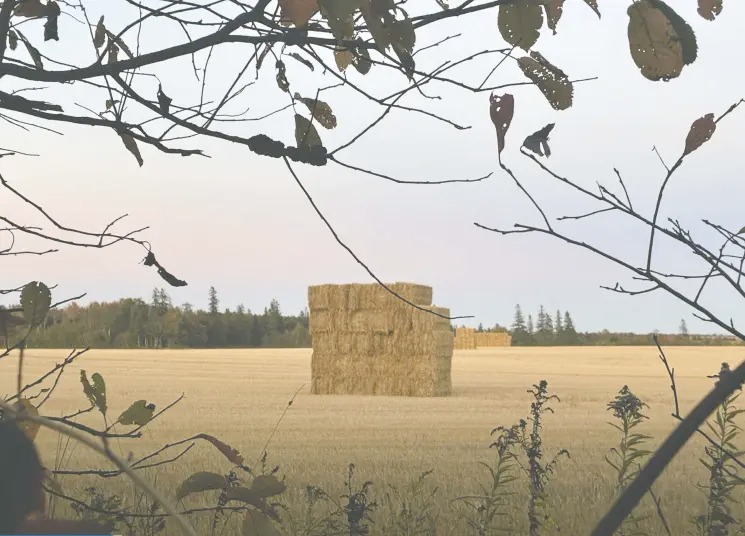Last week our coalition made a presentation to the Standing Committee on Natural Resources and Sustainability about our main concerns regarding land use in PEI and how they should be addressed. Thanks to Stu Neatby!
PROTECTING THE LAND
Time to remove IRAC from land protection role, urges coalition
11 Oct 2025 STU NEATBY
RYAN ROSS
The Coalition for the Protection of P.E.I. Lands recommends that IRAC be stripped of its role in enforcing and administering the Lands Protection Act due to a lack of transparency and oversight. The act is unique to P.E.I. and was put in place in 1982 because of concerns about consolidation of limited P.E.I. lands by off-Island corporations.
A citizen’s group is calling for the Island Regulatory and Appeals Commission (IRAC) to be stripped of its responsibilities related to administering and enforcing the Lands Protection Act.
In a presentation before the standing committee on natural resources and environmental sustainability, members of the Coalition for the Protection of P.E.I. Lands argued IRAC’s governing legislation lacks public transparency or oversight.
RECENT INVESTIGATIONS
Coalition member Boyd Allen also noted the findings of two recent land investigations – the 2020 Brendel Farms investigation and a previous investigation into Buddhist-owned land holdings from 2018 – have been kept secret. As such it is difficult to assess the work completed by IRAC in both cases.
“What is needed is a commission free from political and corporate interference with full authority to carry out proactive investigations and prescribed remedies,” Allen said.
“Most importantly the commission shall be transparent and accountable to the legislative assembly.”
UNIQUE TO P.E.I.
IRAC administers the Lands Protection Act, a law that restricts the landholdings of individuals and corporations to 1,000 and 3,000 acres, respectively. The LPA is unique to P.E.I. and was put in place in 1982 due to concerns about consolidation of limited P.E.I. lands by off-Island corporations.
The coalition’s recommendation comes as IRAC is in the midst of a new investigation of the landholdings of two Buddhist organizations in Kings County, the Great Enlightenment Buddhist Institute Society and the Great Wisdom Buddhist Institute.
Several individuals have claimed for years that the two groups have circumvented the Lands Protection Act due to either landholdings of lay followers of the group or of corporations that may or may not be connected to either group.
That said, there has not been any public finding of wrongdoing by either Buddhist group. The listed landholdings the GEBIS and GWBI organizations themselves are well within the LPA’s land size limits.
PUBLIC INQUIRIES
Speaking to The Guardian after the committee meeting, Allen said investigations into landholdings corporations should be conducted under the Public Inquiries Act.
“IRAC, within itself, doesn’t have the capacity to do these investigations. They have got to seek expertise from outside their organization. Under a Public Inquiries Act, you are given the freedom to establish the terms of reference that you need to establish,” Allen said.
Allen noted that the Carver Commission, a 2013 investigation that investigated the Lands Protection Act, was completed as a public inquiry.
Under the Lands Protection Act, non-residents must apply to IRAC to purchase more than five acres of land. IRAC then makes a recommendation, which cannot be seen by the public, about this application to cabinet, which ultimately approves or denies these applications.
Allen said he felt this process should continue but suggested a “stand-alone commission” should make the recommendations to cabinet.
“It can and it should take place with a stand-alone commission that is structured in a manner that allows some element of transparency, some public oversight and some accountability,” Allen said.
IRAC currently has a regulatory role for electricity rates, landlord-tenant disputes and oil and gas pricing, as well as its role administering the Lands Protection Act.
The commission declined to comment when asked by The Guardian about the statements made by the coalition.
LEGAL STANDING
Allen said the current investigation into the Buddhist groups should specifically consider the beneficial owners of land.
Allen said he was also not aware of any consultations taking place in the community related to the current IRAC investigation into Buddhist landholdings. He also said it’s not clear if community members even have legal standing to bring forward evidence.
“If an individual or an organization is willing to bring forward evidence of any wrongdoing in this kind of situation, they have to be assured that they are protected, in so doing,” Allen said.
“And that, up to now, has never been offered.”
Allen said the province is at the risk of losing half of its agricultural land by 2050.
The group also recommended a moratorium be put in place on developments in unincorporated lands until interim actions recommended in the province’s 2021 Land Matters report are implemented.
